Bolivia · Brazil · Colombia · Ecuador · French Guiana · Guyana · Peru · Regions · South America · Suriname · Venezuela
The Amazon is under siege
There are many different groups of indigenous people who live within the green walls of the Amazon rainforest, which spans nine countries in South America. These self-sufficient communities, each with their own individual language and culture, have called the rainforest home for millennia and have done so by living within their means thanks to the bounty of the forest.
 Though their worldviews and cosmovisions may vary, there is a common practice of only harvesting enough food necessary for survival and never excessive amounts of any one species. This ancient ethical principle has ensured the continued health of the forest’s multiplicity of creatures by maintaining the balance necessary to provide for all of Mother Earth’s children.
Though their worldviews and cosmovisions may vary, there is a common practice of only harvesting enough food necessary for survival and never excessive amounts of any one species. This ancient ethical principle has ensured the continued health of the forest’s multiplicity of creatures by maintaining the balance necessary to provide for all of Mother Earth’s children.
 This is vastly different from the consumer culture that plagues our modern world. The need to feed ever-expanding populations of humans across the globe bred the mechanization of agriculture in the 20th century. Technological advancements brought many changes in how farmers planted, watered, and harvested monoculture crops in the name of so-called progress and efficiency as the capacity for more food production grew. However, clear-cutting deforestation and the agricultural practice of fire-fallow cultivation has persisted as a proven method to clear land for agriculture at the expense of Nature. Farmers in countries like Brazil widely use the slash-and-burn method to raze vast swaths of the forest. Despite the fact that the resulting swidden fields are only productive for 3-5 years before they become devoid of nutrients and incapable of supporting new growth for crops or cattle ranching, deforestation persists. Another 5-20 years is necessary for the land itself to recover… if ever. Assuming the topsoil doesn’t fall prey to erosion, of course.
This is vastly different from the consumer culture that plagues our modern world. The need to feed ever-expanding populations of humans across the globe bred the mechanization of agriculture in the 20th century. Technological advancements brought many changes in how farmers planted, watered, and harvested monoculture crops in the name of so-called progress and efficiency as the capacity for more food production grew. However, clear-cutting deforestation and the agricultural practice of fire-fallow cultivation has persisted as a proven method to clear land for agriculture at the expense of Nature. Farmers in countries like Brazil widely use the slash-and-burn method to raze vast swaths of the forest. Despite the fact that the resulting swidden fields are only productive for 3-5 years before they become devoid of nutrients and incapable of supporting new growth for crops or cattle ranching, deforestation persists. Another 5-20 years is necessary for the land itself to recover… if ever. Assuming the topsoil doesn’t fall prey to erosion, of course.
 Already an estimated 20% of the Amazon has been permanently destroyed over the past 40 years. Continual deforestation has led to abnormally dry regional conditions that create a dangerous tinderbox for wildfires in addition to those started by humankind. 2019 alone saw a massive increase of more than double the number of fires raging the year before, and the Amazon continues to be under siege every minute of every day. Reports that more than one football pitch worth of forest is destroyed per minute has people reeling in horror and shock at the destruction of ecosystems and displacement of wildlife. The world is ablaze with outrage at the damage inflicted on the lungs of the earth, which provides at least 20% of the planet’s oxygen, and people are desperately searching for ways to help conservation efforts in order to mitigate this plight.
Already an estimated 20% of the Amazon has been permanently destroyed over the past 40 years. Continual deforestation has led to abnormally dry regional conditions that create a dangerous tinderbox for wildfires in addition to those started by humankind. 2019 alone saw a massive increase of more than double the number of fires raging the year before, and the Amazon continues to be under siege every minute of every day. Reports that more than one football pitch worth of forest is destroyed per minute has people reeling in horror and shock at the destruction of ecosystems and displacement of wildlife. The world is ablaze with outrage at the damage inflicted on the lungs of the earth, which provides at least 20% of the planet’s oxygen, and people are desperately searching for ways to help conservation efforts in order to mitigate this plight.
 The lives and livelihoods of indigenous people who have lived in the Amazon for generations as guardians who protect this fragile zone are in jeopardy. Because of their intimate connection with the forest, they are the people best suited to continue as its guardians, but they need your help. One of the best ways the rest of the world can help protect our largest rainforest is perhaps counterintuitive at first glance. Rather than being ultimately left alone, the Amazon needs responsible and sustainable tourism to become the primary source of economic development so that agriculture and extractive-based sectors are phased out of the region. Communities like the Kichwa Anangu have flourished by making community-led ecotourism their only industry, and are able to safeguard the forest and their way of life as a result. Their success can be used as an exemplar for other communities who decide to take this route in order to protect everything they hold dear.
The lives and livelihoods of indigenous people who have lived in the Amazon for generations as guardians who protect this fragile zone are in jeopardy. Because of their intimate connection with the forest, they are the people best suited to continue as its guardians, but they need your help. One of the best ways the rest of the world can help protect our largest rainforest is perhaps counterintuitive at first glance. Rather than being ultimately left alone, the Amazon needs responsible and sustainable tourism to become the primary source of economic development so that agriculture and extractive-based sectors are phased out of the region. Communities like the Kichwa Anangu have flourished by making community-led ecotourism their only industry, and are able to safeguard the forest and their way of life as a result. Their success can be used as an exemplar for other communities who decide to take this route in order to protect everything they hold dear.
 Regenerating the old-growth forest is truly impossible. Once gone, it’s gone forever. That is why we must all take action immediately. One person can genuinely make a difference in this scenario because everyone who contributes money to conservation and sustainable ecotourism in the Amazon highlights the importance of this natural wonder and helps bolster the people dedicated to its defence. This will add up one by one to effect a wave of positive change. So if you’re searching for a destination to visit, look no further than the jungles of the nine nations of Brazil, Bolivia, Columbia, Ecuador, French Guiana, Guyana, Peru, Suriname, or Venezuela. Make memories to last a lifetime and become an integral part of protecting the planet in perpetuity.
Miguel Andy is General Manager of Napo Wildlife Center. Napo Wildlife Center is an eco-lodge offering unforgettable experiences in the Amazon rainforest of Ecuador, inside Yasuni Biosphere Reserve, which is managed by the Añangu kichwa aboriginal community.
If you would like to be a guest blogger on A Luxury Travel Blog in order to raise your profile, please contact us.
Regenerating the old-growth forest is truly impossible. Once gone, it’s gone forever. That is why we must all take action immediately. One person can genuinely make a difference in this scenario because everyone who contributes money to conservation and sustainable ecotourism in the Amazon highlights the importance of this natural wonder and helps bolster the people dedicated to its defence. This will add up one by one to effect a wave of positive change. So if you’re searching for a destination to visit, look no further than the jungles of the nine nations of Brazil, Bolivia, Columbia, Ecuador, French Guiana, Guyana, Peru, Suriname, or Venezuela. Make memories to last a lifetime and become an integral part of protecting the planet in perpetuity.
Miguel Andy is General Manager of Napo Wildlife Center. Napo Wildlife Center is an eco-lodge offering unforgettable experiences in the Amazon rainforest of Ecuador, inside Yasuni Biosphere Reserve, which is managed by the Añangu kichwa aboriginal community.
If you would like to be a guest blogger on A Luxury Travel Blog in order to raise your profile, please contact us.
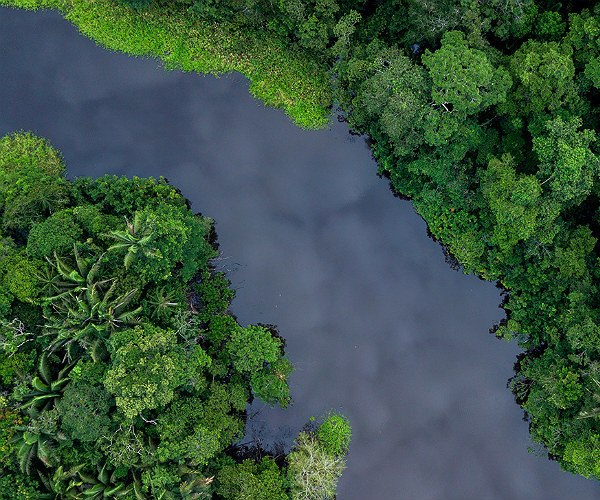 Though their worldviews and cosmovisions may vary, there is a common practice of only harvesting enough food necessary for survival and never excessive amounts of any one species. This ancient ethical principle has ensured the continued health of the forest’s multiplicity of creatures by maintaining the balance necessary to provide for all of Mother Earth’s children.
Though their worldviews and cosmovisions may vary, there is a common practice of only harvesting enough food necessary for survival and never excessive amounts of any one species. This ancient ethical principle has ensured the continued health of the forest’s multiplicity of creatures by maintaining the balance necessary to provide for all of Mother Earth’s children.
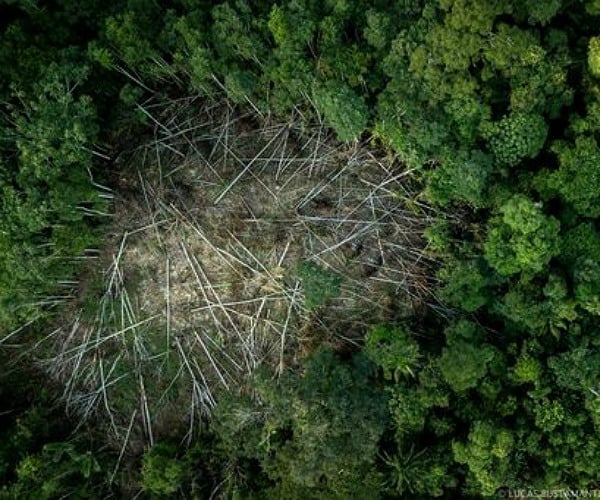 This is vastly different from the consumer culture that plagues our modern world. The need to feed ever-expanding populations of humans across the globe bred the mechanization of agriculture in the 20th century. Technological advancements brought many changes in how farmers planted, watered, and harvested monoculture crops in the name of so-called progress and efficiency as the capacity for more food production grew. However, clear-cutting deforestation and the agricultural practice of fire-fallow cultivation has persisted as a proven method to clear land for agriculture at the expense of Nature. Farmers in countries like Brazil widely use the slash-and-burn method to raze vast swaths of the forest. Despite the fact that the resulting swidden fields are only productive for 3-5 years before they become devoid of nutrients and incapable of supporting new growth for crops or cattle ranching, deforestation persists. Another 5-20 years is necessary for the land itself to recover… if ever. Assuming the topsoil doesn’t fall prey to erosion, of course.
This is vastly different from the consumer culture that plagues our modern world. The need to feed ever-expanding populations of humans across the globe bred the mechanization of agriculture in the 20th century. Technological advancements brought many changes in how farmers planted, watered, and harvested monoculture crops in the name of so-called progress and efficiency as the capacity for more food production grew. However, clear-cutting deforestation and the agricultural practice of fire-fallow cultivation has persisted as a proven method to clear land for agriculture at the expense of Nature. Farmers in countries like Brazil widely use the slash-and-burn method to raze vast swaths of the forest. Despite the fact that the resulting swidden fields are only productive for 3-5 years before they become devoid of nutrients and incapable of supporting new growth for crops or cattle ranching, deforestation persists. Another 5-20 years is necessary for the land itself to recover… if ever. Assuming the topsoil doesn’t fall prey to erosion, of course.
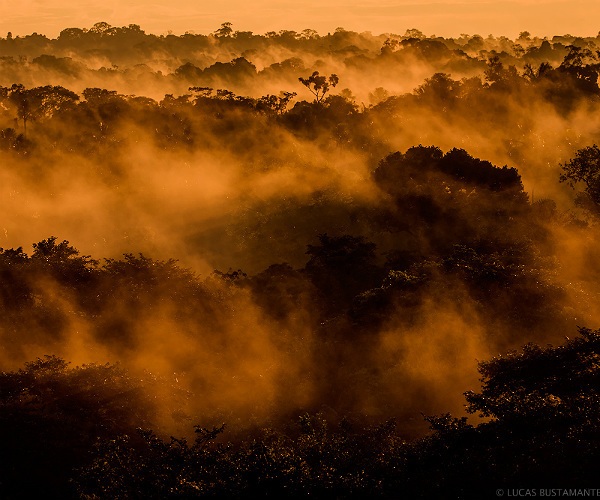 Already an estimated 20% of the Amazon has been permanently destroyed over the past 40 years. Continual deforestation has led to abnormally dry regional conditions that create a dangerous tinderbox for wildfires in addition to those started by humankind. 2019 alone saw a massive increase of more than double the number of fires raging the year before, and the Amazon continues to be under siege every minute of every day. Reports that more than one football pitch worth of forest is destroyed per minute has people reeling in horror and shock at the destruction of ecosystems and displacement of wildlife. The world is ablaze with outrage at the damage inflicted on the lungs of the earth, which provides at least 20% of the planet’s oxygen, and people are desperately searching for ways to help conservation efforts in order to mitigate this plight.
Already an estimated 20% of the Amazon has been permanently destroyed over the past 40 years. Continual deforestation has led to abnormally dry regional conditions that create a dangerous tinderbox for wildfires in addition to those started by humankind. 2019 alone saw a massive increase of more than double the number of fires raging the year before, and the Amazon continues to be under siege every minute of every day. Reports that more than one football pitch worth of forest is destroyed per minute has people reeling in horror and shock at the destruction of ecosystems and displacement of wildlife. The world is ablaze with outrage at the damage inflicted on the lungs of the earth, which provides at least 20% of the planet’s oxygen, and people are desperately searching for ways to help conservation efforts in order to mitigate this plight.
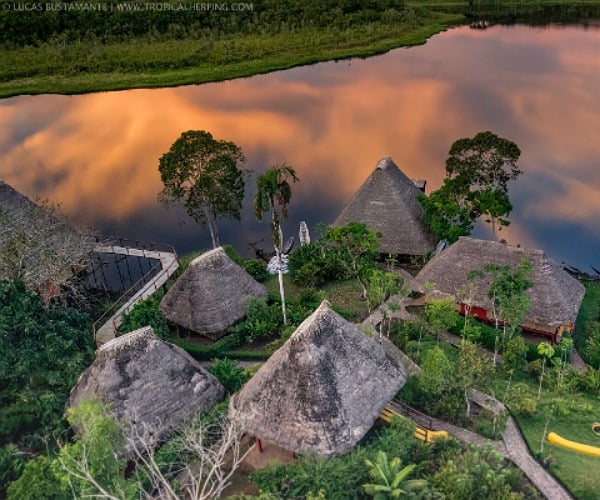 The lives and livelihoods of indigenous people who have lived in the Amazon for generations as guardians who protect this fragile zone are in jeopardy. Because of their intimate connection with the forest, they are the people best suited to continue as its guardians, but they need your help. One of the best ways the rest of the world can help protect our largest rainforest is perhaps counterintuitive at first glance. Rather than being ultimately left alone, the Amazon needs responsible and sustainable tourism to become the primary source of economic development so that agriculture and extractive-based sectors are phased out of the region. Communities like the Kichwa Anangu have flourished by making community-led ecotourism their only industry, and are able to safeguard the forest and their way of life as a result. Their success can be used as an exemplar for other communities who decide to take this route in order to protect everything they hold dear.
The lives and livelihoods of indigenous people who have lived in the Amazon for generations as guardians who protect this fragile zone are in jeopardy. Because of their intimate connection with the forest, they are the people best suited to continue as its guardians, but they need your help. One of the best ways the rest of the world can help protect our largest rainforest is perhaps counterintuitive at first glance. Rather than being ultimately left alone, the Amazon needs responsible and sustainable tourism to become the primary source of economic development so that agriculture and extractive-based sectors are phased out of the region. Communities like the Kichwa Anangu have flourished by making community-led ecotourism their only industry, and are able to safeguard the forest and their way of life as a result. Their success can be used as an exemplar for other communities who decide to take this route in order to protect everything they hold dear.
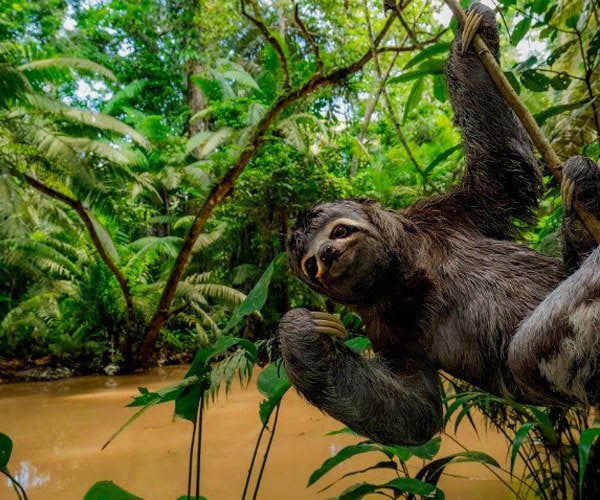 Regenerating the old-growth forest is truly impossible. Once gone, it’s gone forever. That is why we must all take action immediately. One person can genuinely make a difference in this scenario because everyone who contributes money to conservation and sustainable ecotourism in the Amazon highlights the importance of this natural wonder and helps bolster the people dedicated to its defence. This will add up one by one to effect a wave of positive change. So if you’re searching for a destination to visit, look no further than the jungles of the nine nations of Brazil, Bolivia, Columbia, Ecuador, French Guiana, Guyana, Peru, Suriname, or Venezuela. Make memories to last a lifetime and become an integral part of protecting the planet in perpetuity.
Miguel Andy is General Manager of Napo Wildlife Center. Napo Wildlife Center is an eco-lodge offering unforgettable experiences in the Amazon rainforest of Ecuador, inside Yasuni Biosphere Reserve, which is managed by the Añangu kichwa aboriginal community.
If you would like to be a guest blogger on A Luxury Travel Blog in order to raise your profile, please contact us.
Regenerating the old-growth forest is truly impossible. Once gone, it’s gone forever. That is why we must all take action immediately. One person can genuinely make a difference in this scenario because everyone who contributes money to conservation and sustainable ecotourism in the Amazon highlights the importance of this natural wonder and helps bolster the people dedicated to its defence. This will add up one by one to effect a wave of positive change. So if you’re searching for a destination to visit, look no further than the jungles of the nine nations of Brazil, Bolivia, Columbia, Ecuador, French Guiana, Guyana, Peru, Suriname, or Venezuela. Make memories to last a lifetime and become an integral part of protecting the planet in perpetuity.
Miguel Andy is General Manager of Napo Wildlife Center. Napo Wildlife Center is an eco-lodge offering unforgettable experiences in the Amazon rainforest of Ecuador, inside Yasuni Biosphere Reserve, which is managed by the Añangu kichwa aboriginal community.
If you would like to be a guest blogger on A Luxury Travel Blog in order to raise your profile, please contact us.Did you enjoy this article?
Receive similar content direct to your inbox.


It’s a dramatic title for a powerful piece, worrying that the Amazon is under such threat.
There have been signs in 2019 that many people are increasingly aware of the dangwrs life on our planet faces but will 2020 see mankind significantly changing its ways?
Hello John, it is a dramatic title, as we live the danger of some industries trying to get more of the Amazon land on a continuous basis. On the same way, your question is very accurate, sometimes we see reality on TV and as it seems to be far away, we don’t take action. It should question us and to actually lead us to help the people protecting these places.
Waking up to read this on Christmas Day is sad and terrifying. While so many of us are concerned with the trivialities of opening presents and cooking the Christmas dinner we are oblivious to the world around us dying. Thousands of miles from the Amazon, Australia is on fire. Can there be a more potent symbol of the destruction of the natural world than a continent ablaze?
Hello Suzy, unfortunately, we know fires in Australia went worst during new years eve. We hope people affected is walking out of this one already. That’s why we should take action and support initiatives to protect nature and to empower local communities against conflictive activities.
This is a great piece of heartfelt writing Andy. I hope that readers share this and that your powerful words help to change the world.
Hello Judy, thank you for your kind words. These words come from the hearth of the Amazon. Thank you for your support!!
Thanks for sharing Andy, it is important to motivate people to visit the Amazon rainforest and show communities a tree has more value standing.
Hello Marcel, thanks to you and the wonderful work Latin Trails is doing every day to help communities to protect the Rainforest.
Totally agree that visiting the Amazon is counter-intuitive. If we can get a constant flow of good numbers it can make a cash contribution to conservation. We also need travellers to go back home and persuade people that not only should we preserve the Amazon but also that other people should visit too.
Hello Ben, that’s totally correct!!, by investing on Community based tourism, you don’t only get to know about a destination directly from truly locals, but you effectively help to better protect the zone and local culture.
Deforestation is something that makes me so sad. I know there’s a lot that goes on in harming on environment with air pollution and landfill and such, but cutting down the lungs of the earth and destroying the habitats of the people and animals that live there just seems far more irreparably destructive and inexcusable. Of course, the fires there are other places like those destroying parts of Australia just shows how wild and dangerous changing climates and nature can be. Sad times indeed.
I do still think that every little helps when it comes to helping our environment and that if individuals do their bit, it adds up. Much in the same way as you’ve mentioned with contributing money to sustainable ecotourism and conservation efforts. I just hope that more is done on a bigger level, where those sadly far too in control of what goes on in this world, take notice. Power to those communities who still protect their lands and their way of life.
Hello Jen, you are actually right. If those in power give a better support to local communities, understanding the importance of working altogether on an inclusive way, nature will be the most benefited one. But we can also do our little part, by supporting protective initiatives.
The Amazon is considered to be the “lungs of the earth” because of the vast land filled with different kinds of plants and trees that produce 20% of the world’s oxygen supply. However, it faces a lot challenges in our fast changing world considering globalization and the rise of modern technologies. It is very unfortunate that the Amazon has been taken for granted by many people and fail to see its importance in the biodiversity. Also, I firmly believe that large corporations around the world can contribute in the protection of not just the Amazon but the planet itself. People in power must know what to prioritize between profit and preservation of the planet. Progress can be very dangerous at times if it does not lead to common good.
I think that we would all agree that large corporations around the world should take on more corporate social responsibility for preserving the environment. The trouble is that most companies are actually owned by the shareholders, that’s people like you and me. We put our hard-earned savings into shares and we expect a good share of the profit every 6 months. If we don’t get good dividends we sell our shares and move onto a company who will make us a profit. Worse still are the companies that invest our pension funds, we put them under pressure to invest in profitable companies, so you can see how the environment gets squeezed out of the equation.
Hello Shelley, thank you for your words. Local indigenous actually talk about “Sumak Kawsay”, which can be translated to Good Living and it is a goal for every community to facilitate each person to reach this Sumak Kawsay. It implies, for example, to put life before income and people before money. That’s why, supporting local communities does make a huge difference when traveling the world.
Hello Gerald, you are correct, it is not a simple issue. However, we must know it is a matter of “bread for today hunger for tomorrow”, as we locally use to say. So we can realize some investments are not going to be seen by us, but by our future generations.
Great post, it reads like a book almost. There are some really cool places to think about visiting in South America that most people have probably never even heard about it. I realize there is ecological trouble. Thanks for bringing this to our attention.
Hello David, thank you for your collaboration to this post. There are in fact many places to visit in South America, from massive cities to cozy rural areas and wild primitive spots where nature its on its original state.
I worry that this story might slip down the news agenda as there seems to be so much else going on in 2020. The future and survival of the Amazon, which is connected to the survival of so many species including human beings, just can not be submerged by other here today and gone tomorrow stories. In recent weeks the Coronavirus and subsequent share price collapse has seemed to dominate front pages and news bulletins once again environmental concerns seem to be dropping off the bottom of the agenda. As Sir David Attenborough and Greta Thunberg constantly remind us time is running out – if it has not run out already.
Hello Kenny, thank you for your contribution. It is actually true, not many people remembers now about the late Amazon or Australia’s fires that destroyed hectares of forest. It is our duty to keep this issues on mind so we push constant support to Communities living peacefully on these places, for generations.